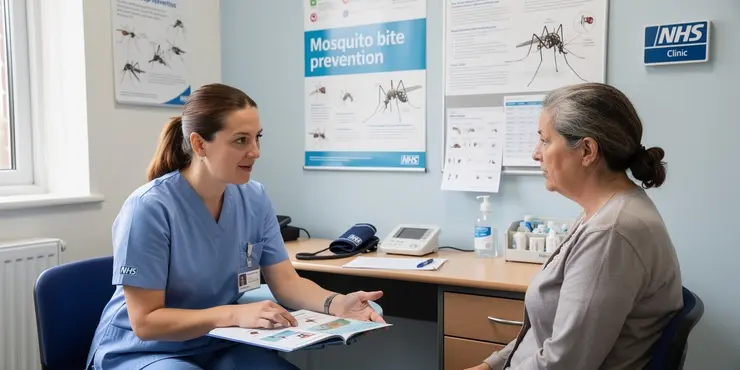
Find Help
More Items From Ergsy search
-

How is the Marburg virus transmitted?
Relevance: 100%
-

What is the Marburg Virus?
Relevance: 95%
-

Can Marburg virus disease be prevented?
Relevance: 94%
-

Is the Marburg virus related to the Ebola virus?
Relevance: 94%
-

What research is being done on the Marburg virus?
Relevance: 91%
-

Is there a vaccine for Marburg virus?
Relevance: 89%
-

Where was the Marburg virus first discovered?
Relevance: 87%
-

How long is the incubation period for the Marburg virus?
Relevance: 87%
-

Can Marburg virus disease recur after recovery?
Relevance: 84%
-

What measures are being taken to control Marburg virus outbreaks?
Relevance: 83%
-

How do health authorities confirm a Marburg virus outbreak?
Relevance: 83%
-

What is the mortality rate of Marburg virus disease?
Relevance: 82%
-

What is the typical progression of Marburg virus disease?
Relevance: 81%
-

How can healthcare workers protect themselves from Marburg virus infection?
Relevance: 81%
-

How is Marburg virus disease diagnosed?
Relevance: 80%
-

Has Marburg virus caused any major outbreaks?
Relevance: 79%
-

What are the symptoms of Marburg virus disease?
Relevance: 79%
-

Are there any countries at higher risk for Marburg virus outbreaks?
Relevance: 78%
-

What role do fruit bats play in Nipah Virus transmission?
Relevance: 64%
-

Are new variants more transmissible?
Relevance: 54%
-

What is the Ebola virus?
Relevance: 54%
-

How is Nipah Virus transmitted?
Relevance: 49%
-

How is the Zika virus transmitted?
Relevance: 49%
-

How is Chikungunya virus transmitted?
Relevance: 48%
-

How is West Nile Virus transmitted?
Relevance: 47%
-

What is Nipah Virus?
Relevance: 46%
-

Is there a cure for Nipah Virus?
Relevance: 45%
-

Can Nipah Virus be transmitted from person to person?
Relevance: 45%
-

Are UK mosquitoes capable of transmitting Zika virus?
Relevance: 45%
-

Which animals are known to carry Nipah Virus?
Relevance: 45%
-

Does the UK have Zika virus?
Relevance: 44%
-

Can Zika virus be spread from person to person in the UK?
Relevance: 44%
-

How is blood screened to prevent disease transmission?
Relevance: 44%
-

Is Zika virus present in the UK?
Relevance: 44%
-

Can men in the UK transmit Zika virus if infected?
Relevance: 43%
-

Can Nipah Virus cause outbreaks?
Relevance: 43%
-
Is Zika virus screened for in blood transfusions?
Relevance: 42%
-

Why are Nipah Virus outbreaks considered a public health concern?
Relevance: 41%
-

Should UK travelers be concerned about Zika virus?
Relevance: 40%
-

What regions are most at risk for Nipah Virus outbreaks?
Relevance: 40%
Introduction to the Marburg Virus
The Marburg virus is a rare but highly infectious virus that causes severe hemorrhagic fever in humans and non-human primates. It was first identified in 1967 in Marburg and Frankfurt, Germany, and in Belgrade, Yugoslavia (modern-day Serbia). The virus belongs to the same family as the Ebola virus, the Filoviridae family. Understanding how the Marburg virus is transmitted is crucial for preventing outbreaks and protecting public health.
Transmission from Animals to Humans
The primary source of the Marburg virus is fruit bats, specifically the Egyptian fruit bat (Rousettus aegyptiacus), which is considered the reservoir host of the virus. The bats themselves do not display symptoms, but they can harbor the virus and spread it through their excretions. Humans can become infected through prolonged exposure to environments where fruit bats reside, such as caves or mines. Transmission occurs when humans have direct contact with the bats or their excretions, which may contaminate surfaces in these environments.
Human-to-Human Transmission
Once a human is infected, Marburg virus can spread from person to person through direct contact with an infected person’s bodily fluids. These fluids include blood, saliva, sweat, vomit, urine, and feces. The virus can also be transmitted through surfaces and materials, such as bedding or clothing, that have been contaminated with these fluids. Consequently, caregivers and family members are at a higher risk if they are in close contact with patients.
Transmission in Healthcare Settings
Healthcare settings can be a significant site for the spread of the Marburg virus, particularly if proper infection control measures are not in place. Healthcare workers are at a heightened risk of infection due to potential exposure to patients’ bodily fluids. Transmission in hospitals can occur via contaminated medical equipment or insufficient protective gear. Implementing strict infection control measures, such as using personal protective equipment (PPE) and safe injection practices, is vital to prevent the spread within healthcare facilities.
Preventive Measures
Preventing the transmission of the Marburg virus involves a combination of avoiding contact with potential animal hosts and ensuring robust infection control practices in healthcare settings. People should avoid caves or mines inhabited by fruit bats and consume only thoroughly cooked animal products. In outbreak situations, isolating patients and monitoring those who have had contact with infected individuals can help control the spread. Educating communities on the risks and transmission modes of the Marburg virus is also an essential component of prevention efforts.
What is the Marburg Virus?
The Marburg virus is very rare and can make people and some animals very sick. It was first found in 1967 in two cities in Germany and in Belgrade, which is now called Serbia. This virus is similar to a virus called Ebola. It is important to learn how people catch the Marburg virus so we can stop it from spreading and keep people healthy.
How Do People Get the Virus from Animals?
The Marburg virus mostly comes from fruit bats, especially a type called the Egyptian fruit bat. These bats do not get sick from the virus, but they can carry and spread it. People can catch the virus if they spend a lot of time in places like caves or mines where these bats live. You can get the virus if you touch bats or anything they leave behind.
How Do People Spread the Virus to Each Other?
Once a person is sick with the Marburg virus, it can spread to others. This happens if someone touches the sick person's blood, spit, sweat, puke, pee, or poop. The virus can also spread from things like beds or clothes that have these fluids on them. Family members and people caring for the sick person are more likely to catch it if they are close to them.
How Can the Virus Spread in Hospitals?
Hospitals can be places where the Marburg virus spreads, especially if safety rules are not followed. Doctors and nurses could catch the virus if they touch sick people’s fluids without wearing the right protection. The virus can also spread through dirty medical tools. To stop this, hospitals need to use protection like gloves and masks and keep everything clean and safe.
How Can We Stop the Virus?
To stop the Marburg virus, we need to avoid contact with bats and keep hospitals safe. People should stay away from caves or mines with bats and should cook meat well before eating. If there is an outbreak, sick people should be separated, and anyone who has been near them should be watched. Teaching people about the virus is very important to help stop it from spreading.
Frequently Asked Questions
What is the Marburg virus?
The Marburg virus is a highly infectious virus that causes Marburg virus disease, a severe hemorrhagic fever in humans and non-human primates.
How is the Marburg virus transmitted to humans?
The Marburg virus is transmitted to humans through direct contact with the blood, tissues, or body fluids of infected animals, such as fruit bats and primates.
Can the Marburg virus be transmitted between humans?
Yes, the Marburg virus can be transmitted between humans through direct contact with the blood, secretions, organs, or other bodily fluids of infected people, and through surfaces and materials contaminated with these fluids.
What is the natural reservoir of the Marburg virus?
The natural hosts of the Marburg virus are fruit bats of the Pteropodidae family, particularly the Rousettus aegyptiacus species.
Can the Marburg virus be transmitted through the air?
There is no evidence to suggest that the Marburg virus is transmitted through the air in natural outbreaks. It primarily spreads through direct contact with infected bodily fluids.
How can healthcare workers protect themselves from Marburg virus transmission?
Healthcare workers can protect themselves by using personal protective equipment (PPE), following strict infection control procedures, and avoiding direct contact with infected patients' bodily fluids.
Can you get Marburg virus from animals?
Yes, humans can become infected with Marburg virus through contact with infected animals, such as when preparing meat from infected animals or through bites from bats.
Is it possible to contract Marburg virus from food?
It is possible if the food is contaminated with the bodily fluids of infected animals or humans, although this is not a common mode of transmission.
Can Marburg virus survive on surfaces?
The Marburg virus can survive on surfaces for several hours, and transmission can occur if someone touches those contaminated surfaces and then contacts their mucous membranes.
Are there any vaccines for Marburg virus?
There are currently no widely approved vaccines for the Marburg virus, although research and development efforts are ongoing.
How long is the incubation period for Marburg virus?
The incubation period for Marburg virus disease is typically between 2 to 21 days after exposure.
Can Marburg virus be transmitted through sexual contact?
Yes, Marburg virus can be transmitted through sexual contact, as the virus has been detected in the semen of male survivors for several months after recovery.
What precautions should be taken to prevent Marburg virus spread during an outbreak?
Precautions include isolating infected individuals, using PPE for caregivers, following proper burial practices, and conducting community education on avoiding contact with bats and primates.
Is there a risk of Marburg virus spreading internationally?
While there is always a risk, the potential for Marburg virus to spread internationally is considered low. Effective containment and control measures can help prevent its spread.
Can Marburg virus be transmitted through water?
There is no evidence that the Marburg virus can be transmitted through water. Transmission primarily occurs through direct contact with infected bodily fluids.
What animals are known to be carriers of the Marburg virus?
Fruit bats, specifically the Rousettus aegyptiacus species, are considered natural reservoirs, but non-human primates can also become infected and transmit the virus.
Can Marburg virus be contracted from insect bites?
There is no evidence to suggest that Marburg virus can be transmitted through insect bites.
How is the Marburg virus different from Ebola virus in terms of transmission?
The Marburg virus and Ebola virus have similar modes of transmission, primarily through direct contact with infected bodily fluids. Both are also believed to originate from bat species.
Who is most at risk of contracting Marburg virus?
Those at increased risk include healthcare workers, family members of infected individuals, and people with close contact with infected animals such as fruit bats or primates.
What can be done to reduce the risk of Marburg virus in endemic regions?
Measures include educating communities about the virus, reducing exposure to fruit bats and primates, improving sanitation and hygiene, and preparing healthcare facilities with proper infection control protocols.
What is the Marburg virus?
The Marburg virus is a virus that can make people very sick.
It can give people a fever and make them feel weak.
Sometimes, it can cause bleeding and be very dangerous.
Doctors try to help people who catch this virus.
If you want to know more, ask a nurse or a doctor. They can explain more about it.
The Marburg virus is a very strong virus that makes people and some animals very sick. It causes a bad sickness called Marburg virus disease, which gives people a high fever and can make them bleed.
How do people catch the Marburg virus?
People can catch the Marburg virus from sick animals. This includes bats and monkeys. It can also spread between people.
Here are some ways to help understand:
- Watch short videos about the Marburg virus.
- Use picture books that show how the virus spreads.
- Talk with someone who knows about viruses.
The Marburg virus can make people sick. It spreads to people by touching blood, tissues, or body fluids from sick animals. These animals can be fruit bats or primates.
Can people catch the Marburg virus from each other?
Yes, people can catch the Marburg virus from other people. This happens if they touch blood, spit, or anything wet from a person who is sick. It can also spread if you touch things that have these wet things on them.
It's important to wash your hands and clean things to stay safe. Ask an adult for help if you have questions.
Where does the Marburg virus live in nature?
The Marburg virus lives in some animals. Scientists think it lives in a rare type of bat. This bat is called the fruit bat.
If you find it hard to read, you can use a finger or a ruler to help you follow the words. You can also ask someone to read it with you.
Big fruit bats carry the Marburg virus. These bats belong to the Pteropodidae family. One type of bat that carries the virus is called Rousettus aegyptiacus.
Can people catch the Marburg virus from the air?
The Marburg virus is a very bad germ. It makes people very sick.
People cannot catch the Marburg virus just by breathing air. It does not spread through the air like a cold or the flu.
The virus spreads when people touch the blood or body fluids of someone who is sick with it.
It is important to wash hands and stay away from people who are sick with the virus.
If you want to know more or if you need help, talk to a doctor or an adult you trust.
Using pictures and simple explanation videos can help understand more about how the virus spreads.
The Marburg virus doesn’t spread through the air during normal outbreaks. It spreads when people touch body fluids from someone who is sick with the virus.
How can healthcare workers stay safe from Marburg virus?
Healthcare workers can follow these steps to stay safe:
- Wear protective clothing, like gloves and masks.
- Wash hands often with soap and water.
- Keep distance from people who are sick.
- Use special tools to check the health of patients.
- Get training about the Marburg virus.
Remember, staying clean and careful helps keep workers safe.
Healthcare workers can stay safe by using safety gear, following rules to stop infections, and not touching sick people’s body fluids.
Can animals give you the Marburg virus?
Yes, people can get sick from the Marburg virus. This can happen if they touch or eat meat from sick animals. Bats can also spread the virus if they bite someone.
Can you get Marburg virus from food?
Food can spread sickness if it has the spit, sweat, or other wet stuff from sick animals or people on it. But this doesn't happen often.
Can Marburg virus live on things we touch?
The Marburg virus can stay on things, like tables or doorknobs, for a few hours. You can get sick if you touch those things and then touch your eyes, nose, or mouth.
Is there a vaccine for the Marburg virus?
There is no known vaccine for the Marburg virus yet.
But doctors and scientists are working hard to create one.
If you want to learn more or need help, you can ask a doctor or use computer programs that explain things in a simple way.
Right now, there are no vaccines for the Marburg virus that everyone agrees on. But, scientists are working hard to create one.
For extra help, you can use pictures or videos about how vaccines are made. Also, asking a friend or family member to read with you might make things easier to understand.
How long is the wait before Marburg virus makes you sick?
The Marburg virus is a type of germ that can make people very ill.
When a person gets the germ, it takes some time before they start to feel sick. This time is called the "incubation period."
For the Marburg virus, this wait is usually between 2 and 21 days.
Helpful Tip: If you want to understand more, you can use pictures or videos about the virus.
Marburg virus disease usually takes between 2 and 21 days to make someone sick after they have been exposed.
Can you get Marburg virus from sex?
Yes, you can catch the Marburg virus from sex. The virus can stay in the bodies of men who got better from it. It can be in their semen for months.
How can we stop the spread of Marburg virus?
Here are some easy steps to help stop the virus:
- Wash your hands often with soap and water.
- Stay away from people who are sick.
- Do not touch wild animals.
- Cook meat really well before eating.
- If you feel sick, tell a doctor.
If you need help understanding, ask a friend or a family member.
To stay safe, keep away from people who are sick. People who take care of sick people should wear special clothes to protect themselves. Follow safe ways when someone is buried. Learn and teach others how to stay away from bats and monkeys.
Can the Marburg virus spread to other countries?
There is a chance that the Marburg virus could spread to more countries.
Here are some ways to help understand this better:
- Use pictures and maps to see where the virus is.
- Watch videos that explain the virus in simple words.
- Listen to someone read the information out loud.
There is a small chance that the Marburg virus could spread to other countries. But the risk is not high. We can stop the virus from spreading by using good plans and actions.
Can you catch Marburg virus from water?
No, you cannot catch Marburg virus from water.
Marburg virus spreads through close contact with an infected person's blood or body fluids.
A good way to stay safe is to wash your hands and be careful around sick people.
There is no proof that the Marburg virus spreads through water. People usually catch it from touching sick people's blood or spit.
What animals can have the Marburg virus?
The Marburg virus can be carried by some animals. Here is a simple list:
- Bats: Some types of bats can have the virus.
- Monkeys: Certain monkeys might also carry it.
To understand better, you can look at pictures of these animals. You can also use audio tools to help read this aloud.
Fruit bats called Rousettus aegyptiacus carry the virus. Sometimes, monkeys can get the virus and pass it on too.
Can you get the Marburg virus from insect bites?
Marburg virus is a kind of germ that makes people sick.
People cannot get the Marburg virus from insect bites.
Marburg virus spreads when people touch body fluids from someone who is sick.
There is no proof that the Marburg virus spreads through insect bites.
How do people catch the Marburg virus and Ebola virus differently?
The Marburg virus and the Ebola virus can make people very sick. They spread in some similar ways but also have differences.
Similar Ways: Both viruses can spread when you touch body fluids, like blood or vomit, from someone who is sick.
Different Ways: There are some small differences in how these viruses move. It is important to listen to health experts for more information.
What Can Help: Use simple tools to help understand, like pictures and videos. Talking with a doctor or a nurse is also a good idea.
The Marburg virus and Ebola virus spread in similar ways. They spread when you touch body fluids from someone who is sick. Both viruses probably come from bats.
Who can catch Marburg virus easily?
Some people have a higher risk of getting sick. These people include:
- Doctors and nurses
- Family members of sick people
- People who are close to sick animals like fruit bats or monkeys
You can use tools like pictures or videos to help understand better. Talking to someone who knows about this can also help.
How can we make it safer from Marburg virus in places where it is common?
Here are some ways to help keep people safe from the virus:
- Teach people about the virus and how it spreads.
- Avoid getting close to fruit bats and monkeys.
- Wash hands often and keep places clean.
- Make sure hospitals are ready and know how to stop the virus from spreading.
You can use picture charts to help remember these steps. It might also be good to talk about these steps with someone you trust or a helper.
Useful Links
This website offers general information and is not a substitute for professional advice.
Always seek guidance from qualified professionals.
If you have any medical concerns or need urgent help, contact a healthcare professional or emergency services immediately.
Some of this content was generated with AI assistance. We’ve done our best to keep it accurate, helpful, and human-friendly.
- Ergsy carfully checks the information in the videos we provide here.
- Videos shown by Youtube after a video has completed, have NOT been reviewed by ERGSY.
- To view, click the arrow in centre of video.
- Most of the videos you find here will have subtitles and/or closed captions available.
- You may need to turn these on, and choose your preferred language.
- Go to the video you'd like to watch.
- If closed captions (CC) are available, settings will be visible on the bottom right of the video player.
- To turn on Captions, click settings .
- To turn off Captions, click settings again.
More Items From Ergsy search
-

How is the Marburg virus transmitted?
Relevance: 100%
-

What is the Marburg Virus?
Relevance: 95%
-

Can Marburg virus disease be prevented?
Relevance: 94%
-

Is the Marburg virus related to the Ebola virus?
Relevance: 94%
-

What research is being done on the Marburg virus?
Relevance: 91%
-

Is there a vaccine for Marburg virus?
Relevance: 89%
-

Where was the Marburg virus first discovered?
Relevance: 87%
-

How long is the incubation period for the Marburg virus?
Relevance: 87%
-

Can Marburg virus disease recur after recovery?
Relevance: 84%
-

What measures are being taken to control Marburg virus outbreaks?
Relevance: 83%
-

How do health authorities confirm a Marburg virus outbreak?
Relevance: 83%
-

What is the mortality rate of Marburg virus disease?
Relevance: 82%
-

What is the typical progression of Marburg virus disease?
Relevance: 81%
-

How can healthcare workers protect themselves from Marburg virus infection?
Relevance: 81%
-

How is Marburg virus disease diagnosed?
Relevance: 80%
-

Has Marburg virus caused any major outbreaks?
Relevance: 79%
-

What are the symptoms of Marburg virus disease?
Relevance: 79%
-

Are there any countries at higher risk for Marburg virus outbreaks?
Relevance: 78%
-

What role do fruit bats play in Nipah Virus transmission?
Relevance: 64%
-

Are new variants more transmissible?
Relevance: 54%
-

What is the Ebola virus?
Relevance: 54%
-

How is Nipah Virus transmitted?
Relevance: 49%
-

How is the Zika virus transmitted?
Relevance: 49%
-

How is Chikungunya virus transmitted?
Relevance: 48%
-

How is West Nile Virus transmitted?
Relevance: 47%
-

What is Nipah Virus?
Relevance: 46%
-

Is there a cure for Nipah Virus?
Relevance: 45%
-

Can Nipah Virus be transmitted from person to person?
Relevance: 45%
-

Are UK mosquitoes capable of transmitting Zika virus?
Relevance: 45%
-

Which animals are known to carry Nipah Virus?
Relevance: 45%
-

Does the UK have Zika virus?
Relevance: 44%
-

Can Zika virus be spread from person to person in the UK?
Relevance: 44%
-

How is blood screened to prevent disease transmission?
Relevance: 44%
-

Is Zika virus present in the UK?
Relevance: 44%
-

Can men in the UK transmit Zika virus if infected?
Relevance: 43%
-

Can Nipah Virus cause outbreaks?
Relevance: 43%
-
Is Zika virus screened for in blood transfusions?
Relevance: 42%
-

Why are Nipah Virus outbreaks considered a public health concern?
Relevance: 41%
-

Should UK travelers be concerned about Zika virus?
Relevance: 40%
-

What regions are most at risk for Nipah Virus outbreaks?
Relevance: 40%


